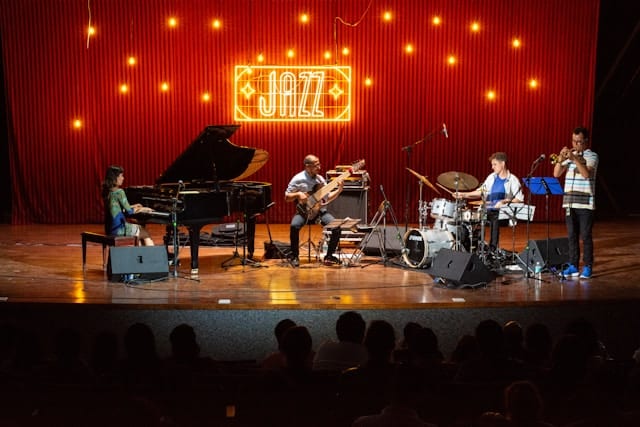Music is an integral part of human life, and musical venues play a crucial role in making this experience accessible to the world. In the UK, the vibrant musical industry is a spectacle to behold. However, the question, ‘how can UK musical venues strategically schedule events to maximize attendance?’ often arises. There are differing opinions, but the best ways to achieve this are through careful planning, understanding your target audience, leveraging social media, optimizing content marketing, and considering virtual events.
Understanding Your Target Audience
Before embarking on any event planning methodology, it’s crucial to understand the audience you’re targeting. This involves knowing their interests, preferences, habits and how they interact with your brand. In the context of musical events, it’s essential to know the genres that appeal to them most, their preferred performance days and times, and even the artists they adore most.
En parallèle : What Are the Best Practices for Data Security in UK Online Banking?
By conducting market research and surveys, you can gather such insights and use them to tailor your events to meet the audience’s needs. Additionally, this can help you identify key selling points for your events, which you can leverage to increase ticket sales and overall attendance. For instance, if your audience is mainly composed of young professionals who are usually busy on weekdays, you can consider scheduling your events over the weekend to accommodate them.
Leveraging Social Media for Event Promotion
Considering the digital age we live in today, social media has become an indispensable tool for promoting events. Platforms such as Facebook, Twitter and Instagram can help notify your followers about upcoming events, engage your audience and even sell tickets.
A voir aussi : What Are the Effective Ways to Reduce Energy Consumption in UK Office Buildings?
For a start, create engaging posts with vivid graphics and catchy captions to pique your audience’s interest. Besides, you can use these platforms to create event pages where you can share updates, answer queries and interact with your prospects. Additionally, you can leverage influencer marketing or sponsored posts to reach a wider audience beyond your followers.
Remember, consistency is key in social media marketing. Regular updates will not only keep your audience informed but also create anticipation for the event.
Optimizing Content Marketing
In the events industry, content marketing goes beyond creating blog posts or social media updates. It involves all the information you share with your attendees – from the initial announcement to the post-event feedback request.
To optimize your content marketing efforts, you can start by creating a content calendar. This could include pre-event blog posts, email newsletters, behind-the-scenes footage, live videos, artist interviews and more. This diverse content helps your attendees feel involved in the event long before it happens, thus building anticipation.
To ensure your content reaches your target audience, you should also consider SEO practices. Incorporate relevant keywords in your content to enhance its visibility on search engines. This will increase your content’s reach, therefore attracting more attendees to your events.
Considering Virtual Events
Given the recent advancements in technology, virtual events have become a viable option for many organizers. They offer a perfect solution, especially when dealing with restrictions such as limited venue capacity or travel restrictions.
By hosting a virtual event or providing a live stream option, you can reach audiences who wouldn’t normally be able to attend in person. This not only increases your event’s attendance but also expands your brand’s reach.
However, hosting a virtual event requires careful planning and execution. From the choice of platform to the quality of streaming, every detail matters. Remember, the success of your virtual event will heavily rely on the attendee’s experience.
Effective Planning
Last but not least, effective planning is key to the success of any event. This involves choosing the right dates, coordinating with artists, ensuring the venue is in perfect condition, among other logistics.
To avoid clashing with other major events, keep an eye on the event calendar for your city or region. This will help you choose a date when your audience is most likely to attend. Also, work closely with artists to ensure their availability and willingness to perform at your venue.
Moreover, ensure the venue is conducive for your attendees. This could involve aspects like accessibility, seating arrangement, sound quality, and more.
In summary, scheduling events to maximize attendance requires a collaborative effort from various sectors. Remember to keep your audience at the center of your event planning and execution. After all, without them, there would be no event.
Harnessing Early Bird and Strategic Ticket Sales
The strategy applied in ticket sales is a significant determinant of an event’s success. The goal is to make the tickets available and appealing to potential attendees. One popular strategy is the use of early bird tickets. These are tickets sold at a discounted price for a limited period before the event. This creates urgency and encourages people to buy tickets in advance.
In addition, you can consider tiered pricing, where you offer different ticket prices based on the benefits attached. For example, you might have standard tickets, VIP tickets, or even group tickets. Ensure that the benefits attached to each tier are attractive and provide valuable experience to the attendees.
When it comes to selling these tickets, make them easily accessible. Consider multiple sales channels such as your website, ticketing platforms, social media, or even physical locations. The easier it is for your audience to buy tickets, the more likely you are to increase sales.
Furthermore, it’s essential to strategically schedule your ticket sales. For instance, launching your ticket sales immediately after announcing the event can help maintain the hype and excitement. You can also schedule reminders or countdowns to the end of early bird periods or the event day to prompt purchases.
Enhancing Attendee Engagement
Attendee engagement is a crucial component of event success. It’s about creating an exciting environment where attendees feel part of the event rather than mere spectators. This not only makes your event more enjoyable but also fosters loyalty among your audience, increasing the chances of them attending future events.
To enhance attendee engagement, consider incorporating interactive elements into your event. This could range from Q&A sessions, meet-and-greets with artists, photo booths, or even interactive displays. Such elements not only make your event fun but also create memorable experiences for your attendees.
Social media can also play a key role in attendee engagement. Encourage your audience to share their experiences on their social platforms using your event hashtag. This not only promotes your event but also fosters a sense of community among your attendees.
Post-event engagement is equally important. Request feedback from your attendees through surveys or social media. This not only shows that you value their opinions but also provides insights that can help improve future events.
Conclusion
In conclusion, maximizing attendance in UK music venues requires a holistic approach that encompasses understanding the target audience, leveraging social media, optimizing content marketing, considering virtual events, strategic ticket sales, and enhancing attendee engagement. It’s about creating a memorable experience that meets the attendees’ expectations and leaves them yearning for more. Most importantly, it involves meticulous planning, execution, and continuous improvement based on feedback. By doing so, UK music venues can ensure event success and longevity in the dynamic music industry.











